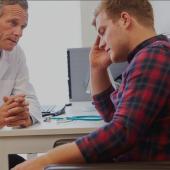Mid-life crisis or andropause is no joking matter. In addition to impacts on mental health, men with andropause experience anxiety, depression, and cognitive impairment. At Nutramedica our mission is to give you the tools and the information that you need to care for your patients, even for those who may show up in an exotic sports car! In this episode psychotherapist Dr Jonathan Prousky shares his insight into diagnosing and treating andropause. As an author and an educator, a chief naturopathic medical officer, and professor at the Canadian College of Naturopathic Medicine, Dr Prousky has been active in dealing with andropause for decades.
Key Takeaways
Signs & Symptoms
Is your patient describing a loss of libido or a lack of sex drive? Are they describing erectile dysfunction? Do they feel more fatigued or do their muscles feel weak? Are they having mood-based problems or a lack of general motivation? What you are looking for in the diagnosis of andropause is at least three of those symptoms as well as low total testosterone level. Then you have both the biochemical and clinical evidence.
Testosterone
When you look at testosterone, there are a lot of moving parts to the diagnosis, because when you think about a total testosterone concentration, what we're talking about is basically three different types. We are first talking about testosterone that's bound to albumin. There is also testosterone that's bound to something called sex hormone-binding globulin and then there are free amounts of testosterone. So it is important to consider all of those together.
Testosterone Therapy
This treatment comes in different forms, whether that's intramuscular or IE by injection or transdermal. All of these approaches have their pluses and minuses, certainly, but must be properly monitored by a clinician who prescribes testosterone replacement therapy.
Lifestyle & Diet
Lifestyle and diet approaches are effective also. We know from published data that weight loss represents a very good strategy to moderate some of the metabolic issues that can contribute to andropause by increasing testosterone levels over time by losing weight.
Ashwagandha
In terms of natural remedies, Ashwagandha is a pretty powerful treatment because on the one hand, it helps with mental health issues, probably by its modulation of the hypothalamic-pituitary adrenal axis and on the other hand it probably has GABA effects. But now we're also seeing that it probably works on hypothalamic-pituitary gonadal access, and has all these positive effects on increasing testosterone and DHT.
Key Quote
“Andropause is about people who are struggling with issues of sex drive, of sexual functioning, of feeling good and having a general sense of well being. They may be having mood issues and even potentially some cognitive-based issues as well, but it's like you're losing your mojo.”
Dr Jonathan Prousky
==
The opinions expressed in this Nutramedica program are those of the guests and contributors. They do not necessarily reflect the opinions of Nutritional Fundamentals For Health Inc.
This video is intended for licensed or registered health professionals and students of health professions only. These statements have not been evaluated by the Food and Drug Administration. Information contained in these programs are not intended to diagnose, treat, cure or prevent any disease.



